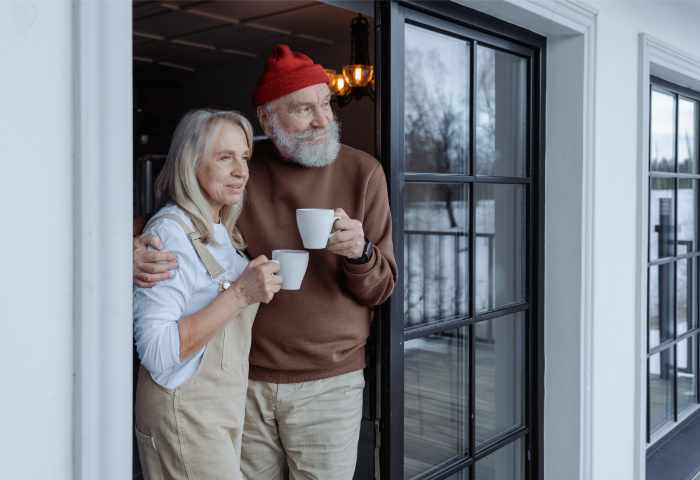Older buyers currently dominate the housing market. People between the ages of 55 and 74 made up 42% of home buyers, as reported by the New York Times. Seniors are making strides in the real estate market, navigating their unique needs and preferences. If you’re a senior thinking about relocating, we’ve put together the nine most important factors to seniors to help you organize your thoughts and create a strong plan.

Whether you’re downsizing, seeking a warmer climate, or just wish to start fresh, buying a home can seem daunting. This article offers an exhaustive checklist to help seniors tick off key considerations when buying a home.
9 Most Important Factors to Seniors
Let’s dive right in!
1. Home Accessibility
A well-thought-out home design plays a significant role in ensuring comfort and ease for seniors. As we age, tasks we once took for granted can become challenging. Imagine carrying groceries through a narrow doorway or navigating a staircase with a laundry basket.
Wider doorways can make these tasks easier, allowing for smooth passage for walkers or wheelchairs. Limiting the number of stairs in a home also enhances mobility and reduces the risk of falls.
But what about the bathroom, one of the most essential rooms in the house? How can we make this space safer and more user-friendly for seniors? Incorporating a walk-in tub can dramatically increase safety and independence in your daily routine.
These also provide safe and comfortable bathing experiences, reducing the risk of slips and falls. After considering all these aspects of accessibility, it might help to search the internet for walk-in tub installation company near me to find a suitable contractor for your home.
2. Local Amenities
No list of the most important factors to seniors would be complete without highlighting local amenities. A significant part of buying a home revolves around your neighborhood. For seniors, having essential services within a comfortable distance becomes more than just convenience; it can directly impact your lifestyle and well-being. You should consider the following:
- Grocery stores: You need easy access to fresh food, supplies, and other necessary items.
- Pharmacies: Regular and immediate access to medications is vital.
- Healthcare facilities: Regular check-ups and emergency services should be within easy reach.
But it’s not just about what’s nearby. It’s also about how you get there. Check local transportation options or the walking routes. If you’re a driver, consider the ease of parking and the distance from your potential new home.
3. Safety and Security
When selecting your new home, the importance of safety and security cannot be overstated. You want to feel confident at home and when you step out for an afternoon stroll.
Start by reviewing local crime rates. Reliable online resources or local law enforcement agencies can provide this information. A low-crime neighborhood contributes greatly to your peace of mind.
A robust security system can be an essential line of defense in your home. From alarms to surveillance cameras, a good system can deter potential intruders and alert you to any unusual activity.
Your home can contribute to its safety. Adequate outdoor lighting can ward off unwanted visitors, and secure doors and windows can offer additional protection.
4. Maintenance Requirements
Lower maintenance options often serve seniors best, ensuring you can enjoy your space without the constant burden of physical labor or the high costs of frequent repairs.
Consider a home with a small yet welcoming outdoor area. A beautiful, easy-to-care-for patio or a small garden can enjoy an outdoor space without the considerable effort required by a large yard.
Similarly, evaluate the home’s overall condition before making a purchase. A recently renovated house or one meticulously maintained can save you from the unexpected costs and labor of constant repairs.
5. Community and Socialization Opportunities
Social interactions and activities play a crucial role in a senior’s well-being. When choosing a new home, consider the community’s potential for providing socialization opportunities. Consider these aspects:
- Proximity to community centers: These places often host activities and events that provide opportunities to meet and interact with people.
- Nearby parks: A park nearby allows for leisurely walks, enjoying nature, and occasional outdoor events.
- Libraries in the vicinity: They’re not just about books; libraries often hold workshops, book clubs, and more, promoting engagement.
- Senior-friendly recreational activities: Check if the neighborhood hosts activities specifically designed for seniors. It could be anything from painting classes to exercise groups.
Selecting a home in a vibrant community can significantly enhance the quality of your social life and overall well-being.
6. Climate
The decision to move to a new area involves more than just packing boxes; it’s about adapting to a new way of life, which is significantly influenced by the local climate. That’s why climate makes the list of most important factors to seniors.
Regions with harsh winters or scorching summers may require homes to have robust heating or cooling systems, leading to higher utility bills. These extreme temperatures might also exacerbate certain health conditions, challenging daily activities.
On the other hand, regions with mild and temperate climates can provide comfortable living conditions year-round. Here, you’ll have more opportunities to engage in outdoor activities, keeping you active and connected to your community.
7. Healthcare Services
Access to quality medical care is about maintaining good health and longevity. Make it a priority to research nearby hospitals and clinics. Knowing where you’ll go for regular check-ups or in case of an emergency is important. Consider factors like distance, quality of care, and range of services offered.
But healthcare isn’t limited to hospitals or clinics. Home healthcare services, which provide medical care, therapy, and assistance with daily activities at your doorstep, can be a valuable resource, especially for those with chronic conditions.
8. Property Taxes and Insurance
Property taxes and home insurance costs are two obligations that can significantly affect your financial stability in the long run.
Property taxes vary from region to region. They are often based on the assessed value of your property and can be a substantial yearly expense. Digging into property tax rates in your future living area helps map out your yearly financial commitments.
Home insurance, a cost you can’t sideline as a homeowner, is another factor to consider. A trusted insurance agent’s advice can simplify the home insurance complexities, ensuring your new property is effectively insured and your investment safeguarded.
9. Professional Assistance
Steering through the real estate market presents its complexities, especially for seniors with particular needs and choices. When you’re looking to find the best Realtor in Louisville, that person can then help you with many other tasks. They tailor their services to the exact needs of each client, including seniors, thereby reducing the stress of the home-buying ordeal.
These skilled experts excel at locating properties that align with your stipulations, from geographical preferences to accessibility demands. They also guide you through the tangled web of documentation, securing a seamless and straightforward deal.
Conclusion
We hope this list of the most important factors to seniors has spurred your thinking. Home buying is laden with unique hurdles and contemplations. You’re not merely picking a property; you’re opting for ease, accessibility, and tranquility. Considerations must cover home accessibility, closeness to amenities, socialization opportunities, safety measures, maintenance necessities, local weather conditions, healthcare facilities, property taxes, and home insurance expenses.
Never shy away from seeking professional assistance. Making knowledgeable choices ensures that your years ahead are indeed bright and fulfilling. Bear in mind that it’s not only about the house; it’s more about the lifestyle it grants.

